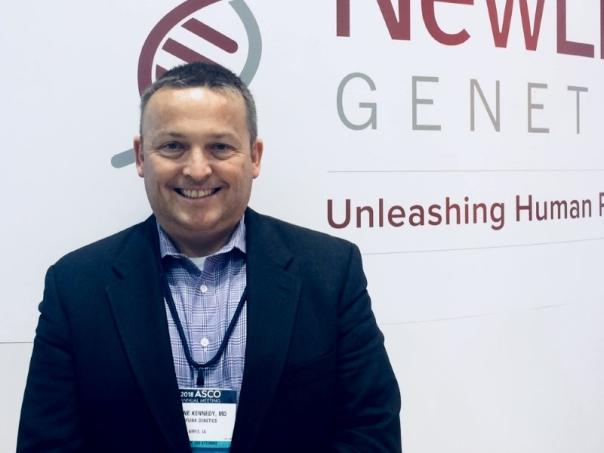NewLink Releases Active Data for IDO Inhibitors indoximod
June 06, 2018 Source: Sina Pharmaceutical
Window._bd_share_config={ "common":{ "bdSnsKey":{ },"bdText":"","bdMini":"2","bdMiniList":false,"bdPic":"","bdStyle":" 0","bdSize":"16"},"share":{ }};with(document)0[(getElementsByTagName('head')[0]||body).appendChild(createElement('script')) .src='http://bdimg.share.baidu.com/static/api/js/share.js?v=89860593.js?cdnversion='+~(-new Date()/36e5)];In the 2017 American Society of Clinical Oncology (ASCO) annual meeting, IDO inhibitors have been hailed as the next hot research area for tumor immunotherapy, but a series of experimental setbacks have even led the academic community to doubt this mechanism. However, just last week, at the new ASCO, NewLink Genetics announced the latest positive experimental data of its IDO drug indoximod, and insisted that IDO inhibitors still have great development prospects.

NewLink CMO Eugene Kennedy, MD (NewLink/LaVoie)
The company disclosed data from a one-arm phase 2 trial of 102 patients with advanced melanoma who received indoximod combined with checkpoint drug therapy. In the trial, 70 patients received indoximod combined with Merck Keytruda, and a small number of patients were treated with indoximod combined with BMS Opdivo and Yervoy. The trial results showed that the overall response rate of the combination was 56%, 19% of patients achieved complete remission, and the median progression-free survival was greater than 1 year.
IDO is called indoleamine (2,3)-dioxygenase. Studies have shown that this enzyme can destroy the ability to kill cancer cells by destroying the tryptophan required for T cell activation. In theory, inhibition of IDO can activate T cells and restore their anticancer effects. IDO inhibitors are cancer drugs developed on the basis of this theory. But at present, three major pharmaceutical giants have suspended, cancelled or reduced 13 clinical trials against IDO inhibitors due to trial failure.
In April of this year, Incyte and Merck's large-scale clinical trial of the IDO inhibitor epacadostat failed surprisingly. The bad news quickly reverberated in the pharmaceutical industry. Subsequently, Incyte announced that multiple advanced clinical trials of its IDO inhibitor epacadostat with Merck, BMS, and AstraZene PD-1/PD-L1 drugs will stop recruiting patients. At the same time, BMS also stopped a number of combined clinical trials of the IDO inhibitor BMS-986205 acquired from Flexus for 1.25 billion.
On May 10, 2018, NewLink received a notice from the Roche Group member Gene Teck that Roche will completely terminate the licensing cooperation agreement between the two parties on October 14, 2014. The termination of Roche’s cooperation with NewLink is undoubtedly a major blow to it. Since the failure of the Phase III trial of the pancreatic cancer vaccine in 2016, the company has been in a downturn. The trial showed that patients who received placebo had a longer life than candidates who received the vaccine algincantel-L. Despite the failure of several other companies' IDO inhibitor trials, NewLink is still confident that the company is reviewing all clinical projects.
The announcement of positive data on IDO inhibitors is undoubtedly a major positive news for NewLink, and the company has been one of the pioneers in the development of IDO inhibitors.
For new positive data, Newlink's CMO Kennedy said: "In about 20 years, we have accumulated a large number of IDO research data, describing the core role of the IDO pathway in the immune response. We insist that the indoximod is unique. The mechanism of action may show efficacy in a variety of combination therapies for a wide range of cancer indications."
According to Kennedy, "Indoximod mimics tryptophan, which causes immune cells to think that tryptophan in the body is at a normal level and maintains immunological activity, thereby increasing the proliferation of effector T cells, or reconverting regulatory T cells into helper T cells. And ultimately promote IDO expression in dendritic cells." It is worth noting that the proportion of PD-L1 positive patients in the trial is relatively low, while the response rate in the PD-L1 negative cohort is higher, which is related to direct enzyme inhibitors. The results of the trials for patients with advanced melanoma are similar.
IDO was the most promising new mechanism to expand the scope of PD-1 drug treatment, but with the failure of Roche and Pfizer to exit this field, especially the failure of ECHO-301, IDO is no longer in sight. Although there are still some people who believe in this regulatory pathway, the gradual withdrawal of major pharmaceutical companies from the development of IDO reflects the disappointment of major players in the IDO mechanism.
Newlink said further data on the development of IDO inhibitors will be presented at the International Symposium on Pediatric Neurooncology in July this year, a phase 1b trial of children with brain stem tumors, primarily evaluating the efficacy of indoximod in combination with radiation and maintenance therapy. In addition, the company will also announce data on Phase 1b/2 studies of patients with acute myeloid leukemia in combination with standard chemotherapy at a medical conference at the end of 2018. (Sina Pharmaceutical Compilation / Fan Dongdong)
Article, image reference source: #ASCO18: Don't write off IDO yet, says NewLink
Infrared Thermal Imager,Thermal Camera,Infrared Thermography,Infrared Thermal Scanner
Shandong Freedoms Technology Co.,Ltd , https://www.sdfreedomtech.com